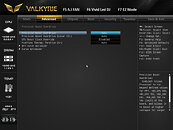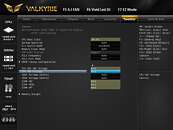- Joined
- Oct 9, 2007
- Messages
- 47,511 (7.49/day)
- Location
- Hyderabad, India
| System Name | RBMK-1000 |
|---|---|
| Processor | AMD Ryzen 7 5700G |
| Motherboard | ASUS ROG Strix B450-E Gaming |
| Cooling | DeepCool Gammax L240 V2 |
| Memory | 2x 8GB G.Skill Sniper X |
| Video Card(s) | Palit GeForce RTX 2080 SUPER GameRock |
| Storage | Western Digital Black NVMe 512GB |
| Display(s) | BenQ 1440p 60 Hz 27-inch |
| Case | Corsair Carbide 100R |
| Audio Device(s) | ASUS SupremeFX S1220A |
| Power Supply | Cooler Master MWE Gold 650W |
| Mouse | ASUS ROG Strix Impact |
| Keyboard | Gamdias Hermes E2 |
| Software | Windows 11 Pro |
BIOSTAR, a leading manufacturer of motherboards, graphics cards, and storage devices, has released a new BIOS update for its X670E VALKYRIE, RACING B650EGTQ, and B650M-SILVER motherboards. This update aims to limit the voltages of AMD Ryzen 7000X3D processors, ensuring improved CPU safety. Recent reports suggest that AMD Ryzen 7000X3D processors are prone to physical damage when overclocked with voltage assistance. This has prompted motherboard vendors to rush BIOS updates with voltage limiters, and BIOSTAR is no exception.
The new BIOS update from BIOSTAR restricts direct voltage to CPU Vcore Voltage, CPU SOC Voltage, and CPU MISC Voltage, preventing over-voltage and reducing the risk of damage to the 7000X3D series CPUs. Additionally, BIOSTAR also has PBO (Precision Boot Overdrive, Default: Auto) function to provide the best performance for 7000X3D series CPUs even under Voltage restrictions.
DOWNLOAD: the latest motherboard BIOS updates for BIOSTAR X670E Valkyrie | BIOSTAR Racing B650E GTQ | BIOSTAR B650M Silver


View at TechPowerUp Main Site
The new BIOS update from BIOSTAR restricts direct voltage to CPU Vcore Voltage, CPU SOC Voltage, and CPU MISC Voltage, preventing over-voltage and reducing the risk of damage to the 7000X3D series CPUs. Additionally, BIOSTAR also has PBO (Precision Boot Overdrive, Default: Auto) function to provide the best performance for 7000X3D series CPUs even under Voltage restrictions.
DOWNLOAD: the latest motherboard BIOS updates for BIOSTAR X670E Valkyrie | BIOSTAR Racing B650E GTQ | BIOSTAR B650M Silver


View at TechPowerUp Main Site

